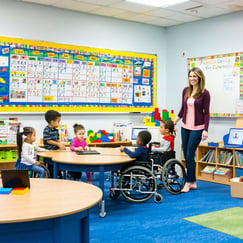Biography: My name is Victor Ferro, and I am proud to be alumni of Franklin Academy's first...
Exceptional Student Education (ESE) in Florida - The Basics
Exceptional Student Education (ESE) in Florida provides tailored instruction and services to students with disabilities, ensuring they receive the support needed to succeed in their education.
Introduction:
What is Exceptional Student Education (ESE)?
 ESE, also known as special education, refers to specially designed instruction and related services provided to students with disabilities. It's designed to meet the unique needs of each student, enabling them to make progress in the general education curriculum. In Florida, ESE services are governed by state and federal laws, including the Individuals with Disabilities Education Act (IDEA).
ESE, also known as special education, refers to specially designed instruction and related services provided to students with disabilities. It's designed to meet the unique needs of each student, enabling them to make progress in the general education curriculum. In Florida, ESE services are governed by state and federal laws, including the Individuals with Disabilities Education Act (IDEA).Who Qualifies for ESE Services?
Students may qualify for ESE services if they have a disability that adversely affects their educational performance. Common disability categories include:
- Specific Learning Disabilities (SLD): Such as dyslexia or dyscalculia.
- Speech and Language Impairments: Affecting communication skills.
- Intellectual Disabilities: Impacting cognitive abilities.
- Emotional/Behavioral Disabilities (EBD): Affecting social and emotional well-being.
- Autism Spectrum Disorder (ASD): Affecting social interaction and communication.
- Orthopedic Impairments: Affecting physical mobility.
- Other Health Impairments (OHI): Such as ADHD or epilepsy.
- Visual Impairments: Affecting sight.
- Hearing Impairments: Affecting hearing.
- Traumatic Brain Injury (TBI): Resulting from an injury to the brain.
- Developmental Delay (for younger children): Significant delays in physical, cognitive, communication, social, or emotional development.
The ESE Process: From Referral to IEP
The journey to ESE services typically involves these key steps:
- Referral: A teacher, parent, or other concerned individual can refer a student for evaluation if they suspect a disability.
- Evaluation: A multidisciplinary team conducts a comprehensive evaluation to determine if the student has a disability and if it impacts their education.
- Eligibility Determination: The team reviews the evaluation results and determines if the student is eligible for ESE services.
- Individualized Education Program (IEP) Development: If eligible, an IEP is created. This document outlines the student's unique needs, goals, and the services they will receive.
- IEP Implementation: The school provides the services outlined in the IEP.
- Progress Monitoring and Review: Regular progress monitoring ensures the IEP is effective, and the IEP is reviewed at least annually.
The Importance of the IEP
The IEP is the cornerstone of ESE. It's a legally binding document that details:
- The student's present levels of academic and functional performance.
- Measurable annual goals.
- Specific special education and related services.
- Accommodations and modifications.
- How progress will be measured.
Parental Rights and Involvement
Parents are essential partners in the ESE process. You have the right to:
- Participate in all meetings related to your child's ESE.
- Review and approve the IEP.
- Request an independent educational evaluation (IEE).
- Resolve disputes through mediation or due process.
ESE at Franklin
At Franklin, we are committed to providing a supportive and inclusive learning environment for all students. We work closely with families to ensure that students with disabilities receive the appropriate services and accommodations to thrive. Our ESE team is dedicated to supporting the individual needs of each student.
As a public charter school, our enrollment is controlled by our random enrollment lottery and our application does not make mention of an IEP or an EP. If you are selected via the lottery, you would be asked to submit any existing IEPs for our ESE Specialists to review. At that time, they will ensure that we would be the least restrictive environment for your student.
As opposed to local school districts, we are not large enough nor do we have enough resources to create 'clusters' and if this is something that your child needs, we may not be the best option for you. Once you receive your enrollment offer, our ESE specialists would be happy to discuss your particular situation.
Resources:
- Florida Department of Education, Office of Exceptional Student Education
- The Individuals with Disabilities Education Act (IDEA)
Conclusion:
Understanding ESE is vital for ensuring every student in Florida has access to a quality education. If you have any questions or concerns about ESE services at Franklin Academy, please don't hesitate to contact us.



